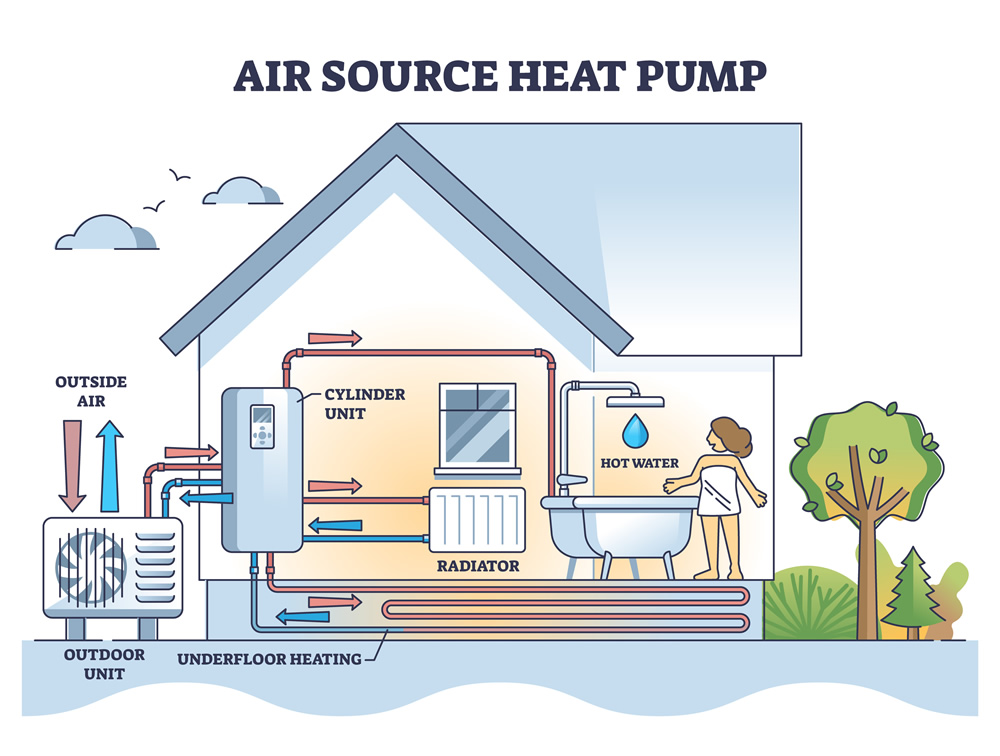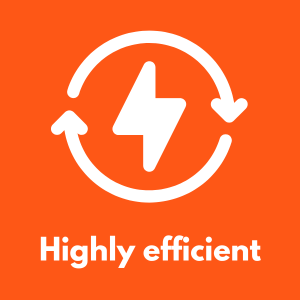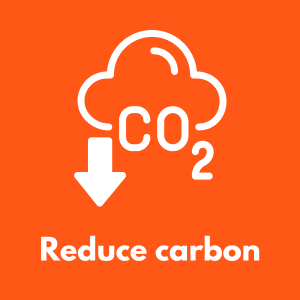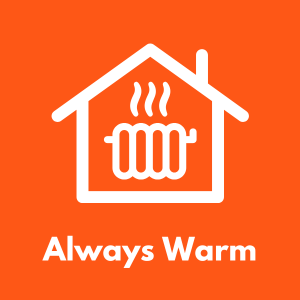Trusted air source heat pump installers
Explore the world of air source heat pumps from a Which? Trusted Trader, rated ‘Excellent’ on Trustpilot. Prices start from £4,580(1)
☑ £7,500 Boiler Upgrade Scheme.(2)
☑ ZERO standing charges for 12 months.(3)
☑ Up to 300% more efficient than traditional boilers. (4)
☑ Reduce your carbon emissions. (5)
*The price above reflects the £7,500 government boiler upgrade scheme and is based on our lowest priced heat pump, cylinder and controls. Your individual quote will be specific to you and your requirements may rise depending on the system required to suit your home.
Speak to an expert – Get a free quote
What is an air source heat pump?
Air source heat pumps (ASHP’s) are an innovative, highly efficient, renewable energy system. They heat your home and hot water using energy from the air outside even in the depths of winter. They are quiet, easy to use, and don’t need much maintenance once installed.
You should find everything you need right here. If not, you can find a more detailed post in our articles section by clicking below.

The different types of heat pump

Ground source heat pumps
These systems extract heat from the ground via buried pipes filled with a water-antifreeze mixture. The pipes are installed either through deep boreholes or in shallow trenches with coiled “slinky” pipes.

Water source heat pumps
Instead of soil, these systems extract heat from water sources like aquifers, lakes, or rivers. They can use either closed loops (pipes) or open systems that draw water directly.

Air source heat pumps
These increasingly popular systems extract heat directly from outside air. A fan draws air over an evaporator coil containing refrigerant.
How do heat pumps work?

Unlike traditional heating systems that generate heat through combustions, heat pumps simply transfer existing energy from one place to another. This fundamental difference is why they’re so efficient.
Traditional heating works by releasing energy stored in materials like wood, coal, or gas through combustion. These materials essentially contain captured solar energy – whether from trees that grew recently, or fossil fuels formed millions of years ago.
Heat pumps, by contrast, don’t create heat – they move it. This process can achieve over 400% efficiency, meaning 1kW of electricity can produce more than 4kW of heat. Here’s how the cycle works:
- A refrigerant circulates through an evaporator (similar to a car radiator)
- A fan draws air across the evaporator, transferring energy to the refrigerant
- This energy causes the refrigerant to boil and turn into vapour
- The vapour is compressed, which generates heat
- The hot vapour passes through a condenser, transferring heat to your home’s water circulation system
- The refrigerant then passes through an expansion valve, cooling it down for the cycle to begin again
Understanding air source heat pumps

Noise
You might be surprised by just how quiet an air source heat pump is.
Like any machine in operation, air source heat pumps do produce noise – it’s about the same as a whisper, the gentle hush of a library, or the sound of a breeze through leaves.

Radiators
Do I need to replace them? It’s a question we hear a lot and it’s an important one. Identifying whether your current radiators are suitable for a heat pump is part of our extensive design process. We’ll answer any questions you’ve got and help you with all the you need before going ahead but don’t worry, we’ll guide you every step of the way.

Efficiencies
We rarely have bitterly cold winters here in the UK.
Your air source heat pump is perfect for the UK climate as it can work off-grid and will still operate when outside temperatures are as low as -15°C. It may work a little harder but you will still be warm and cosy in your home.
The benefits of heat pumps
Air source heat pumps offer significant benefits compared to traditional methods of heating water and homes. Here are some key advantages:

Highly efficient
Up to 300% more efficient than a traditional boiler (4)

Grants
You could qualify for a £7,500 grant from the government (2)

Reduce carbon
Reduce carbon emissions by up to 70%(5)

Save money
Save up to £290 on your energy bills (6)

Always warm
Stay warm with our heat pump promise (7)
How much does a heat pump cost?

The cost of upgrading your heating system is more complex than a single number. However, you could install an Air Source Heat Pump in your home from as little as £4,580(1)
An air source heat pump heating system is specific to your home and the requirements for any installation vary. Things such as the size of your home, its current heating system, and how well insulated it is, all play a part. Let’s look at installation costs, running costs and servicing and maintenance.
*Includes the £7,500 government grant. Eligibility checks apply (2)
Your questions answered
What is a heat pump?
Air source heat pumps (ASHP’s) are an innovative, highly efficient, renewable energy system. They heat your home and hot water using energy from the air outside even in the depths of winter. They are quiet, easy to use, and don’t need much maintenance once installed.
You can read an in-depth article about heat pumps here.
How much will a heat pump cost?
Every heat pump installation we carry out is specific to your home and your personal requirements. There are a wide range of factors that need to be taken into account before we can give you a dedicated quote. What we can say is that alongside the £7,500 Boiler Upgrade Scheme (BUS grant) and any eligible finance options, a complete heat pump system, matched perfectly to your requirements as part of our bespoke system design service and fully installed, could be a lot closer than you think.
Many customers find this a reasonable level of investment for a dependable, robust, and eco-friendly heating system that will keep them warm for years to come. You can find the BUS scheme eligibility criteria here, but we handle all the paperwork and applications, so it won’t be something you’ll have to worry about!
If you want read more about heat pump costs, then read on.
Will a heat pump lower my energy bills?
Installing an air source heat pump is a great start to lowering your energy bills.
You should also consider the following:
- Changing your electricity tariff to a dedicated heat pump tariff
- Installing solar panels and batteries on your property
- Ensuring your property is well insulated
You could save up to £240 a year on your energy bills if replacing an old G-rated gas boiler – and could see comparable energy bills if replacing a new A-rated gas boiler.
Will I need new radiators?
Not always, no but the performance of your heat pump system hinges on the compatibility and efficiency of your radiators.
Larger radiators with convectors are generally the best choice as they have a larger surface area. Careful evaluation and measurement of your existing radiators will ensure that your heating system operates at its best, providing comfort and energy efficiency.
We’ve written an extensive guide to Heat Pumps and radiators here.
Are heat pumps noisy?
If you’re concerned about how loud an air source heat pump is, you might be surprised to instead find out how quiet they are.
Like any machine in operation, heat pumps do produce noise – but how much noise they produce is remarkably low, especially with newer ASHP models designed with a focus on low-noise operation.
The noise is so low that it’s about the same as a whisper, the gentle hush of a library, or the sound of a breeze through leaves.
But if you’re curious to learn how a heat pump produces noise and how much noise it produces, read on.
Are heat pumps efficient?
Air source heat pumps are one of the most efficient heating systems for your home. Generating three times the amount of heat for every kw of energy used. Heat pumps are sustainable, low carbon and help you save energy.
Our in-depth article on Heat Pump efficiency can be found here.
Will a heat pump keep me warm in winter?
While we rarely have blazing hot summers in the UK, we also rarely have bitterly cold winters.
Your air source heat pump is perfect for the UK climate as it can work off-grid and will still operate when outside temperatures are as low as -28°C. It may work a little harder but you will still be warm and cosy in your home.
How much room will a heat pump require?
You’ll need to have space for the heat pump unit to be installed outside of your home.
This may be more challenging if you live in an apartment building. However, there is a lot of freedom over where we can put the unit if you have space. Remember, you will also need space for a hot water tank.
A well-designed and installed system will take all of this into account so you get the most out if your new air source heat pump.
Our Consultants will be able to answer any questions you have.
NOTES
- The price above reflects the £7,500 government boiler upgrade scheme and is based on our lowest priced heat pump, cylinder and controls, with up to 8 radiators upgraded. Your individual quote will be specific to you and your requirements may rise depending on the system required to suit your home.
- Eligibility checks apply. Visit the UK Government website for details: https://www.gov.uk/apply-boiler-upgrade-scheme
- Zero standing charge for 12 months. Unlock £360 in savings with EDF Energy’s Heat Pump & Save Tracker tariff. https://www.edfenergy.com/heating/electric/air-source-heat-pump £164 of savings are based on a customer using Ofgem’s typical domestic consumption of 2700 kWh electricity and with heating provided by an air source heat pump with a coefficient of performance (CoP) of 3.1 providing equivalent heat to that from a 94% gas boiler using 11,500 kWh of gas. A further £196 of savings based on 0p per day electricity standing charge based on the Q2 Ofgem price cap using a regional average. Total saving of £164 + £196 = £360.
- The Energy Saving Trust: With a heat pump, for every unit of electricity you use, you can get three to four times as much heat (300 to 400%) in return. Compare that to a gas or oil boiler.https://energysavingtrust.org.uk/advice/in-depth-guide-to-heat-pumps/#:~:text=cycle%20starts%20over.-,How%20efficient%20are%20heat%20pumps?,a%20gas%20or%20oil%20boiler.
- Heat Pump investment roadmap, UK Government https://www.gov.uk/government/publications/heat-pump-net-zero-investment-roadmap/heat-pump-investment-roadmap-leading-the-way-to-net-zero
- Source: The Energy savings Trust: Potential annual savings of £290 by installing a standard air source heat pump in a three bedroom semi-bedroom detached home in Great Britain, with radiator upgrades as needed.
- With our Heat Pump Promise if your heat pump doesn’t perform as promised, we’ll give you a refund. Terms & Conditions apply https://www.cbheating.co.uk/wp-content/uploads/2025/05/H3373-AW1-V3.pdf


